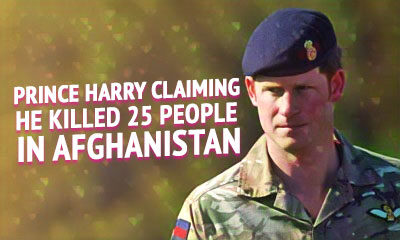Quotes
Alexander The Great Biography & Quotes
Table of Contents
Alexander The Great Quotes
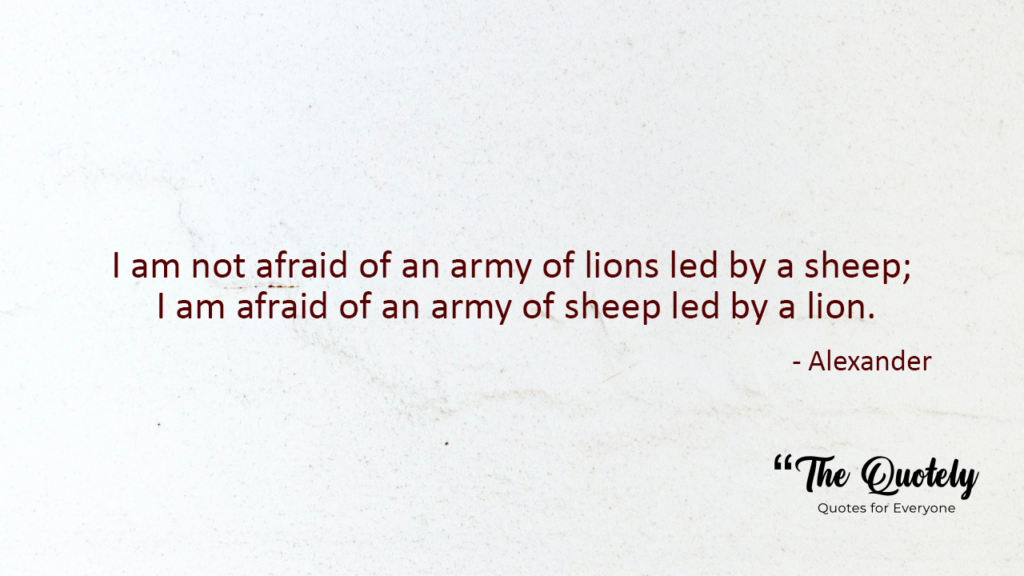
- “I am not afraid of an army of lions led by a sheep; I am afraid of an army of sheep led by a lion.”
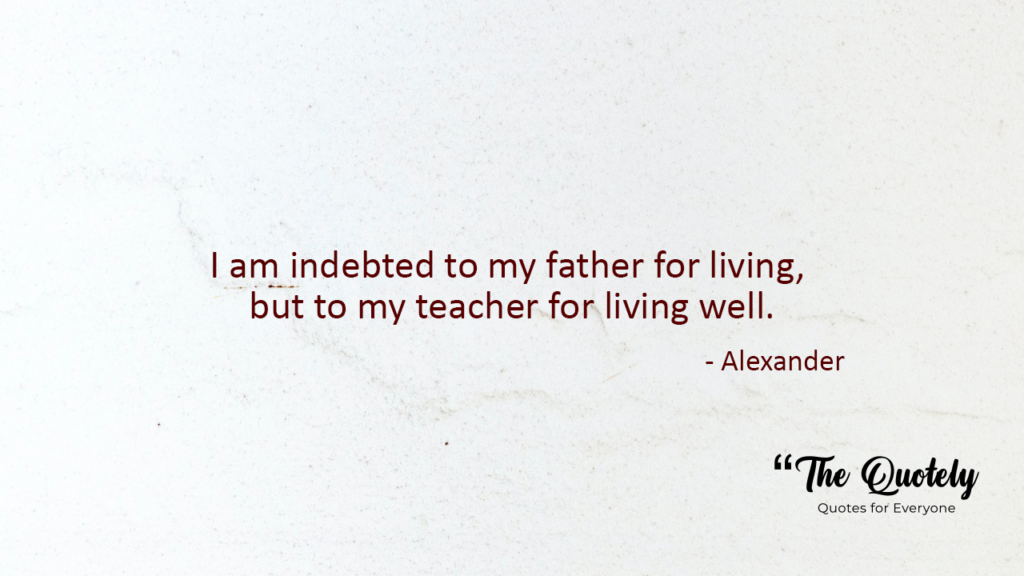
- “I am indebted to my father for living, but to my teacher for living well.”
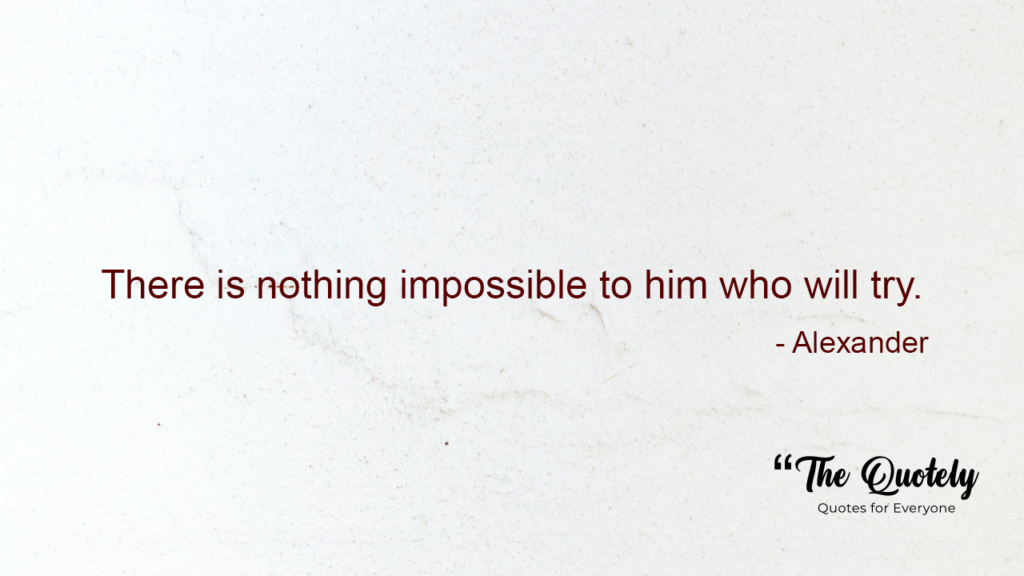
- “There is nothing impossible to him who will try.”
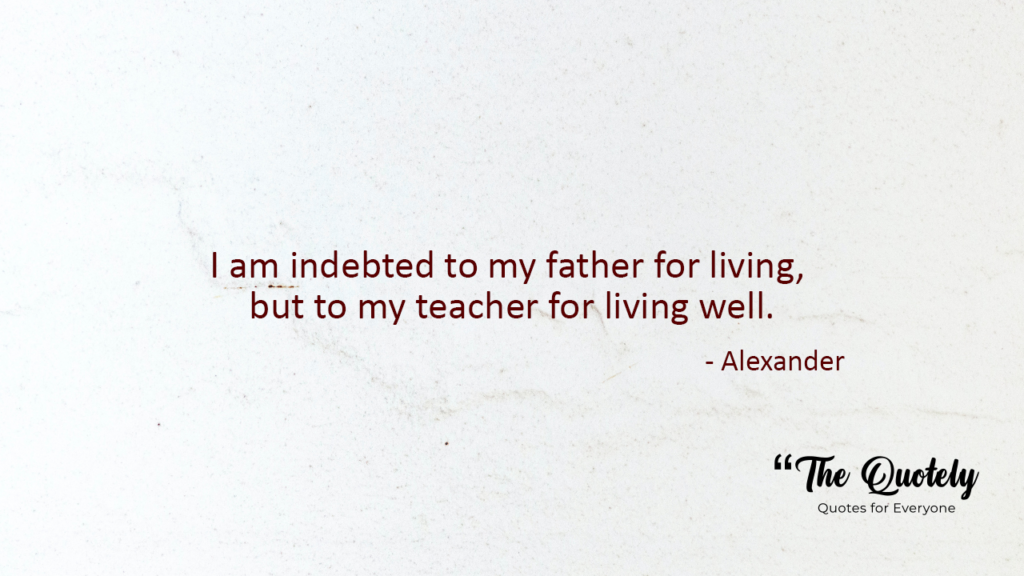
- “I am indebted to my father for living, but to my teacher for living well.”
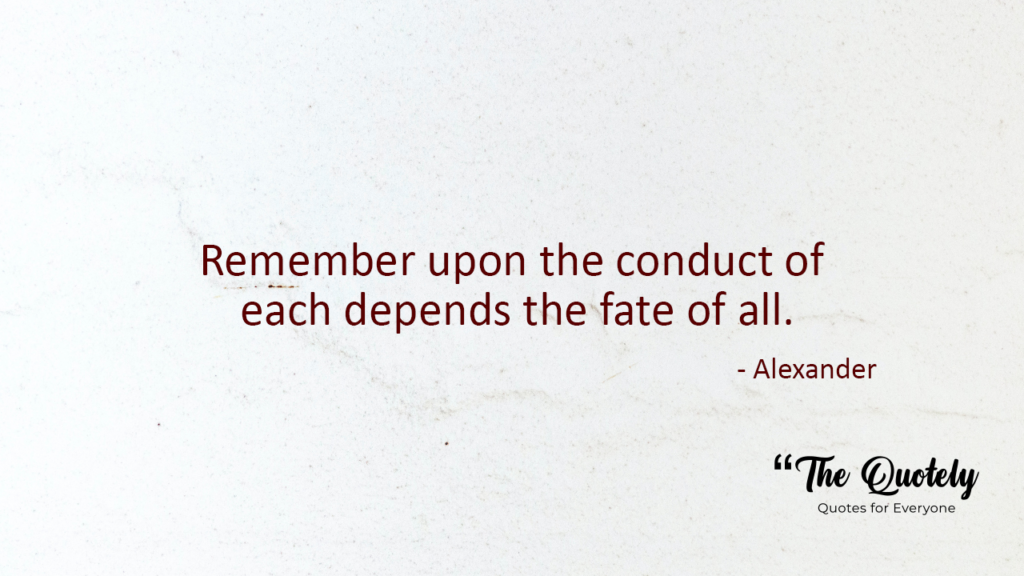
- “Remember upon the conduct of each depends the fate of all.”
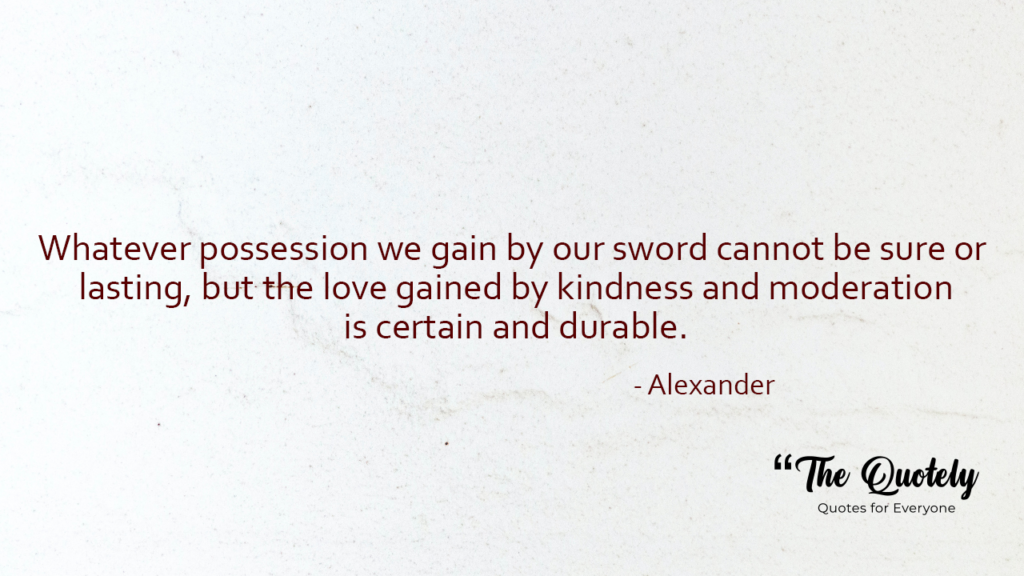
- “Whatever possession we gain by our sword cannot be sure or lasting, but the love gained by kindness and moderation is certain and durable.”
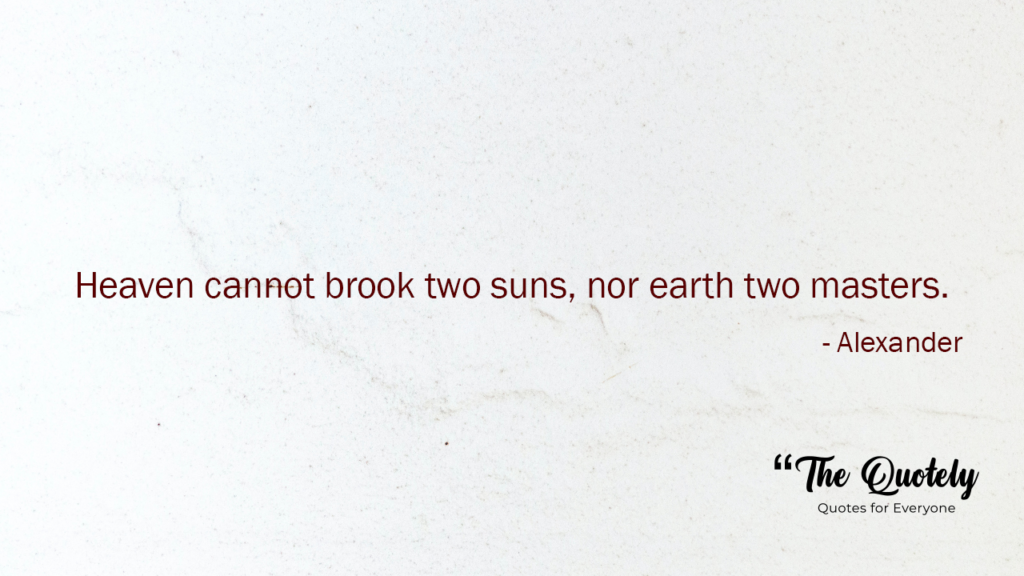
- “Heaven cannot brook two suns, nor earth two masters.”
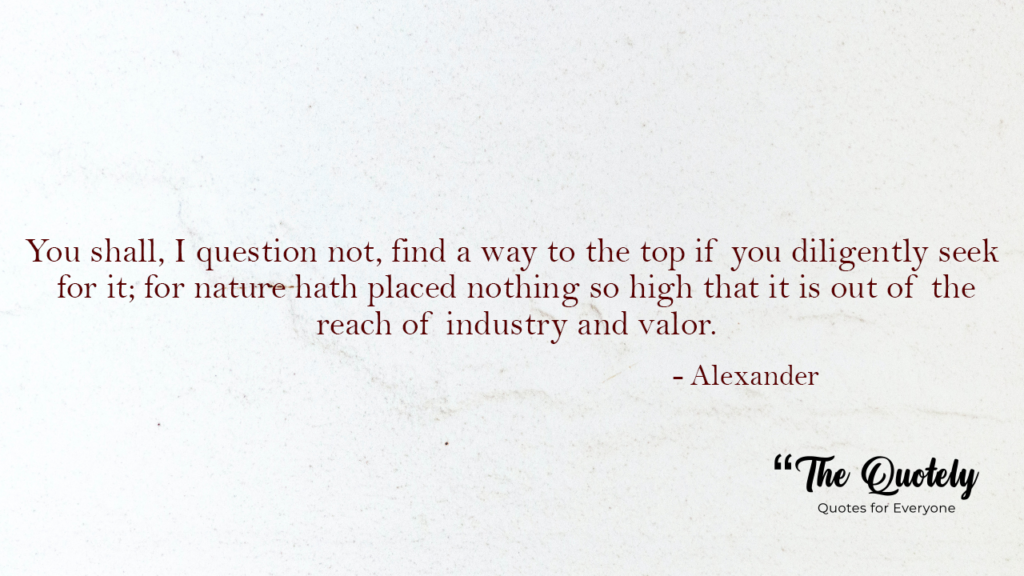
- “You shall, I question not, find a way to the top if you diligently seek for it; for nature hath placed nothing so high that it is out of the reach of industry and valor.”
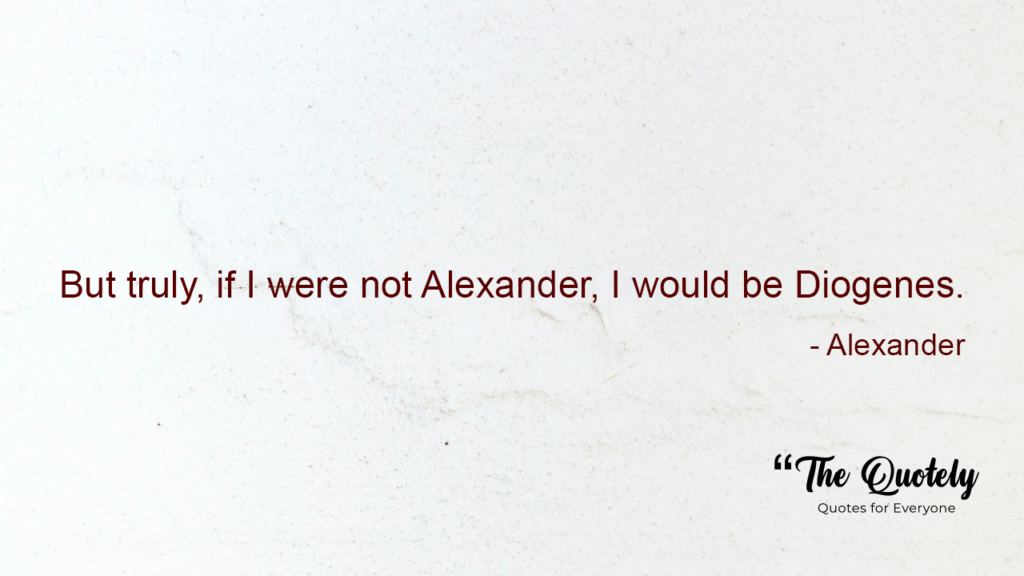
- “If I were not Alexander, I would be Diogenes.”
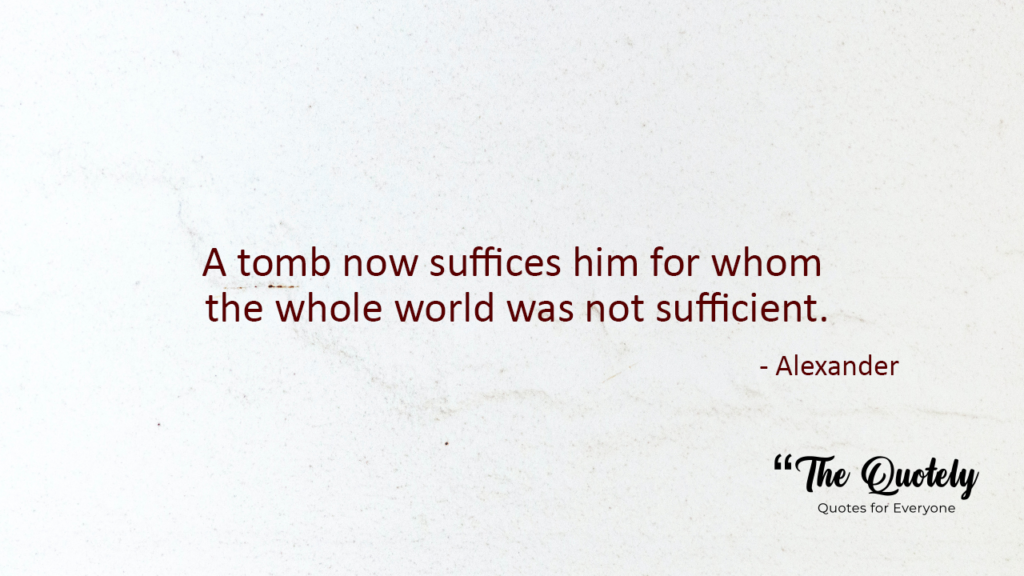
- “A tomb now suffices him for whom the whole world was not sufficient.”
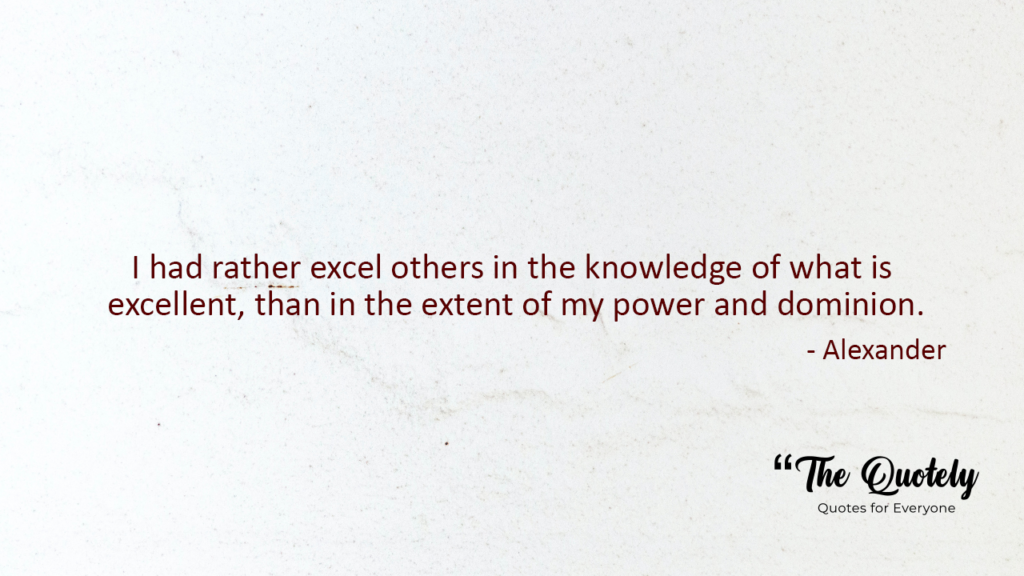
- “I had rather excel others in the knowledge of what is excellent, than in the extent of my power and dominion.”
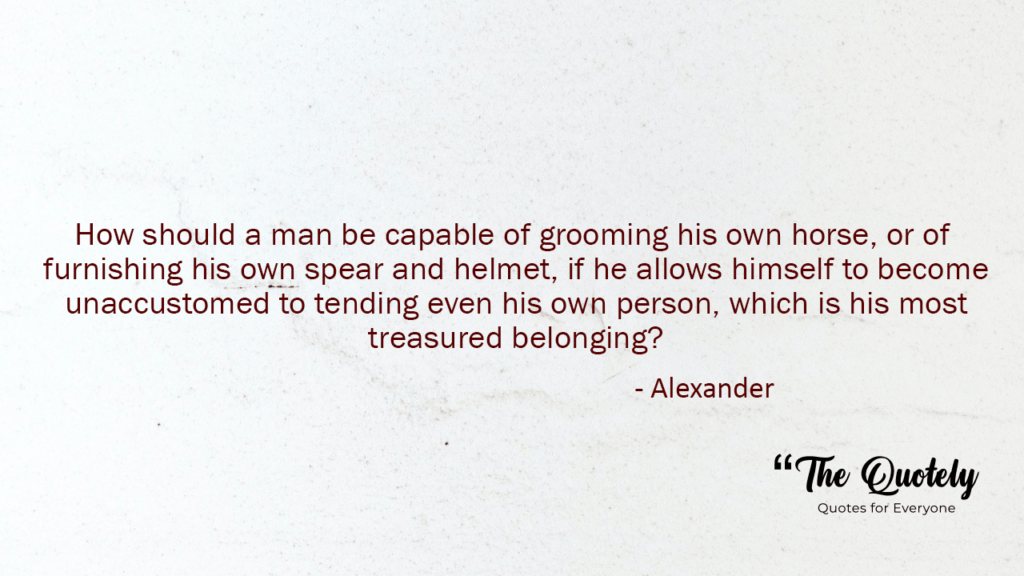
- “How should a man be capable of grooming his own horse, or of furnishing his own spear and helmet, if he allows himself to become unaccustomed to tending even his own person, which is his most treasured belonging?”

- “For my own part, I would rather excel in knowledge of the highest secrets of philosophy than in arms.”
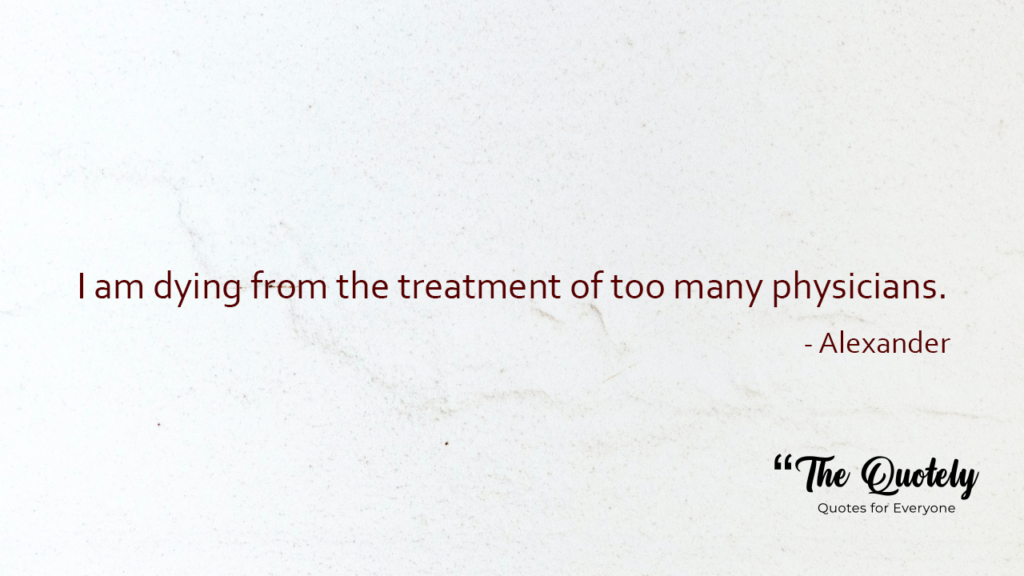
- “I am dying from the treatment of too many physicians.”
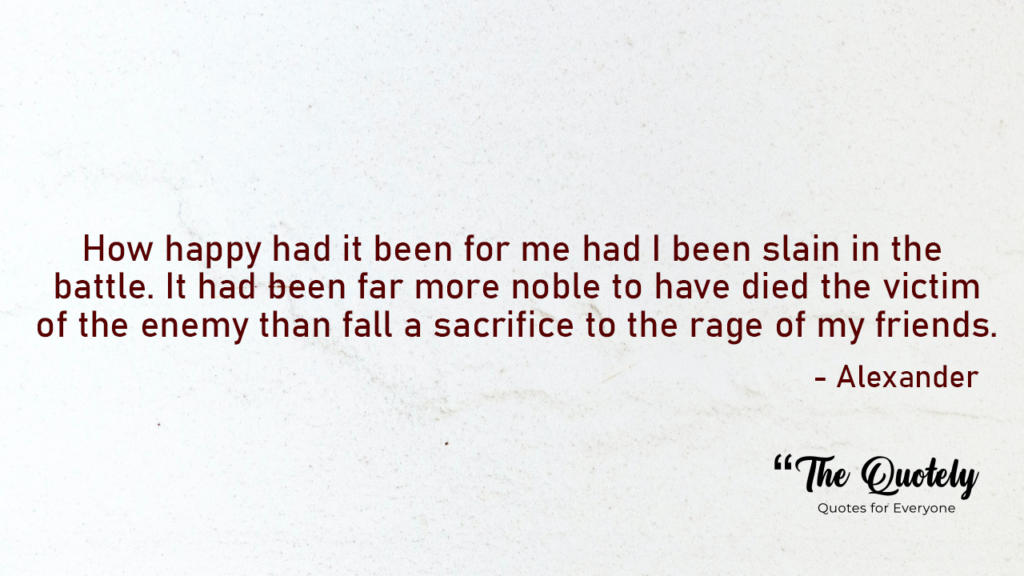
- “How happy had it been for me had I been slain in the battle. It had been far more noble to have died the victim of the enemy than fall a sacrifice to the rage of my friends.”
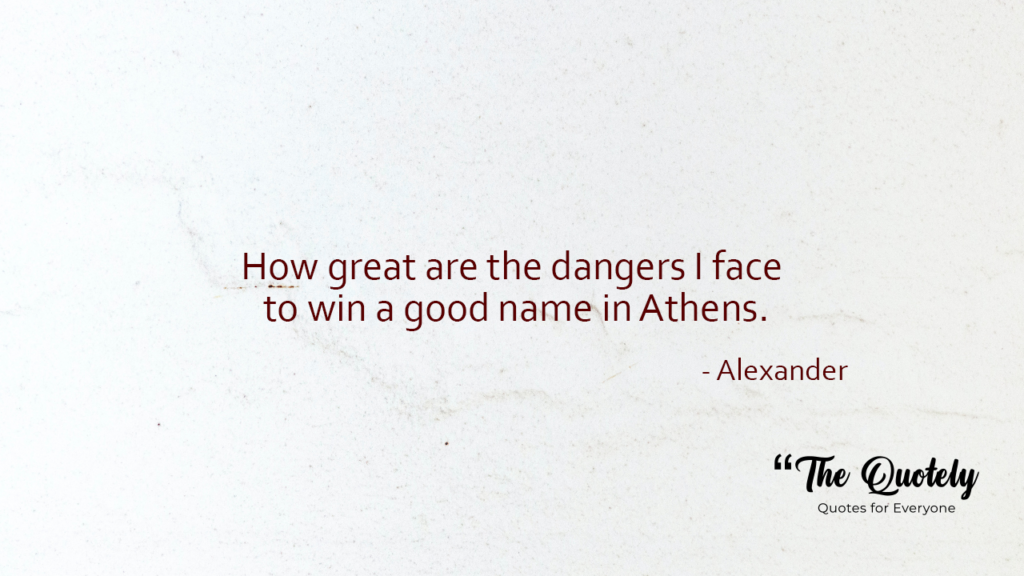
- “How great are the dangers I face to win a good name in Athens.”
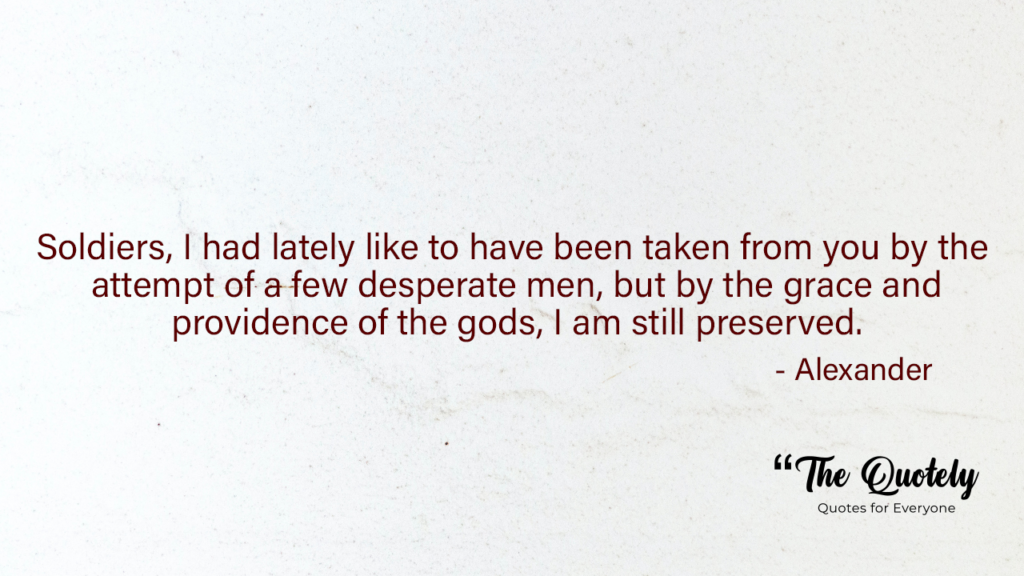
- “Soldiers, I had lately like to have been taken from you by the attempt of a few desperate men, but by the grace and providence of the gods, I am still preserved.”
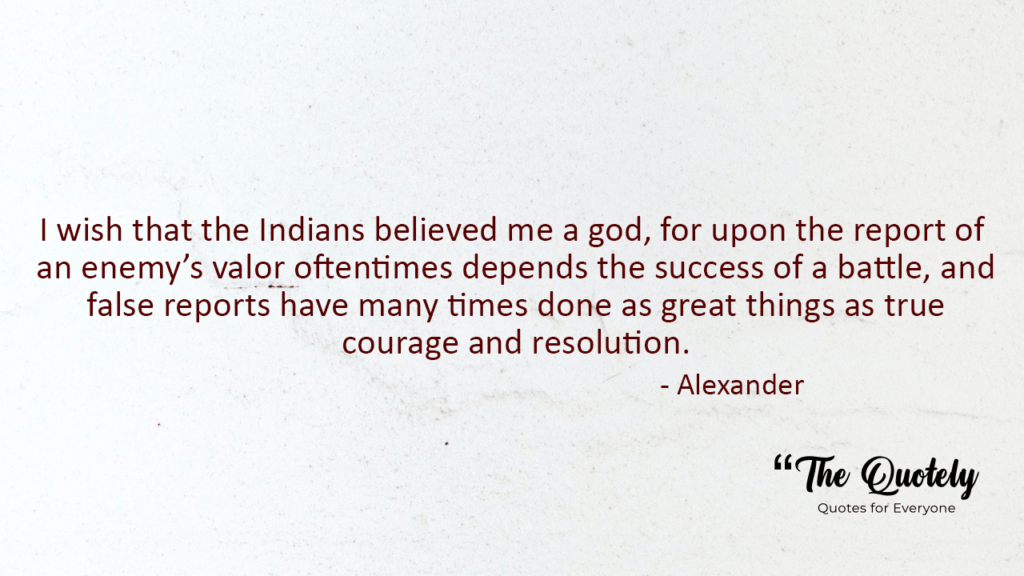
- “I wish that the Indians believed me a god, for upon the report of an enemy’s valor oftentimes depends the success of a battle, and false reports have many times done as great things as true courage and resolution.”
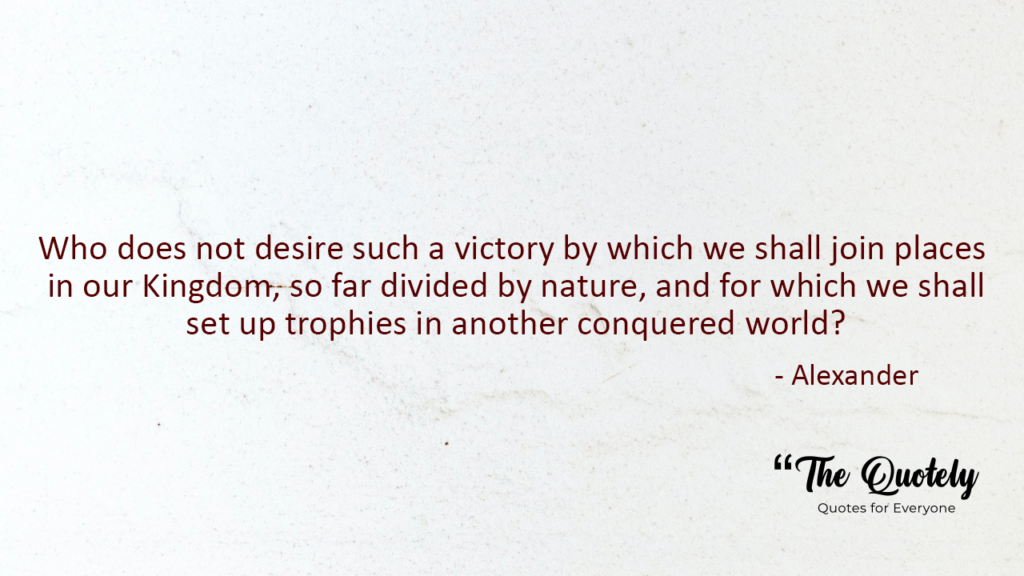
- “Who does not desire such a victory by which we shall join places in our Kingdom, so far divided by nature, and for which we shall set up trophies in another conquered world?”
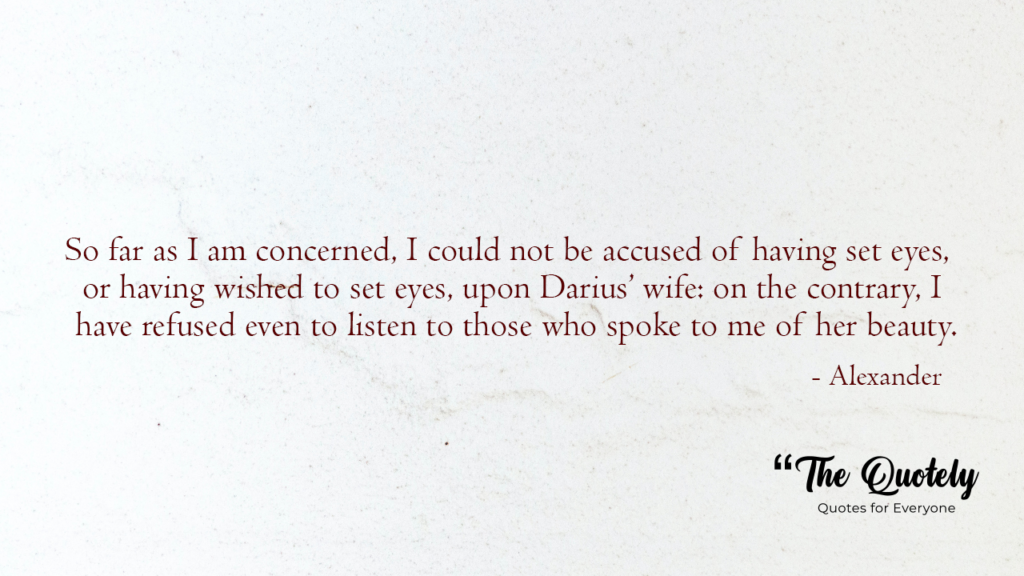
- “So far as I am concerned, I could not be accused of having set eyes, or having wished to set eyes, upon Darius’ wife: on the contrary, I have refused even to listen to those who spoke to me of her beauty.”
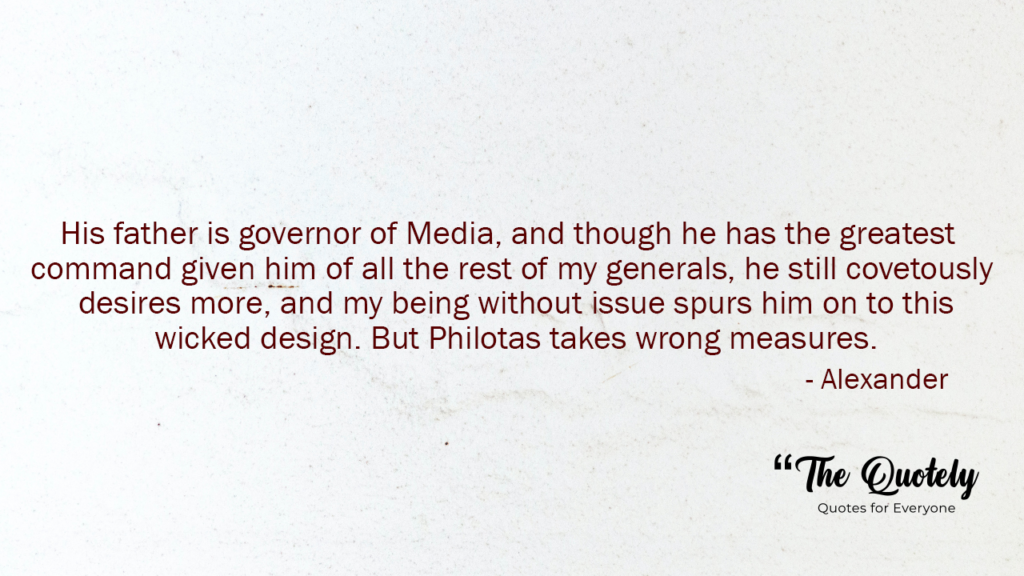
- “His father is governor of Media, and though he has the greatest command given him of all the rest of my generals, he still covetously desires more, and my being without issue spurs him on to this wicked design. But Philotas takes wrong measures.”
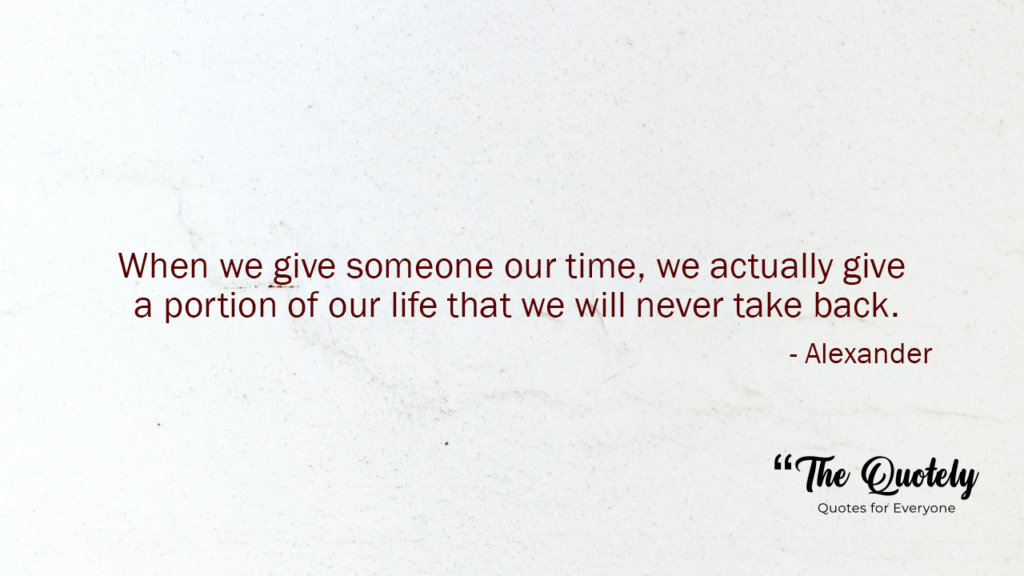
- “When we give someone our time, we actually give a portion of our life that we will never take back.”
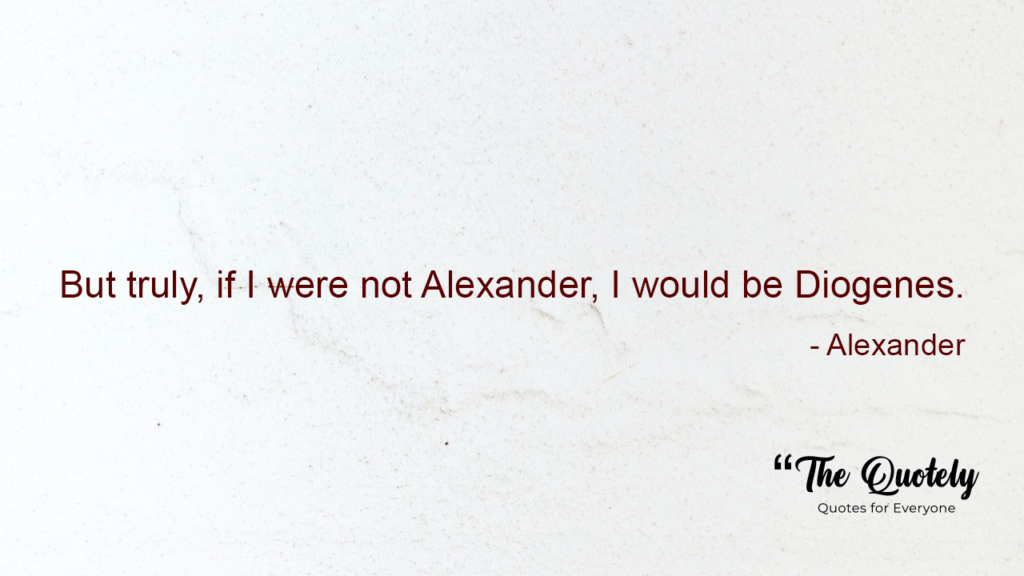
- “But truly, if I were not Alexander, I would be Diogenes.”
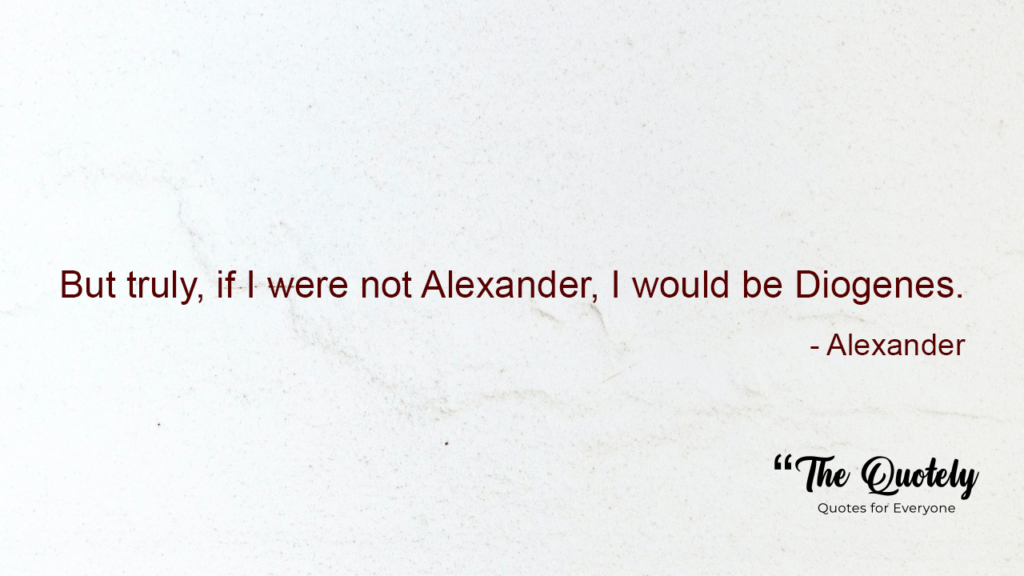
- “Sex and sleep alone make me conscious that I am mortal.”
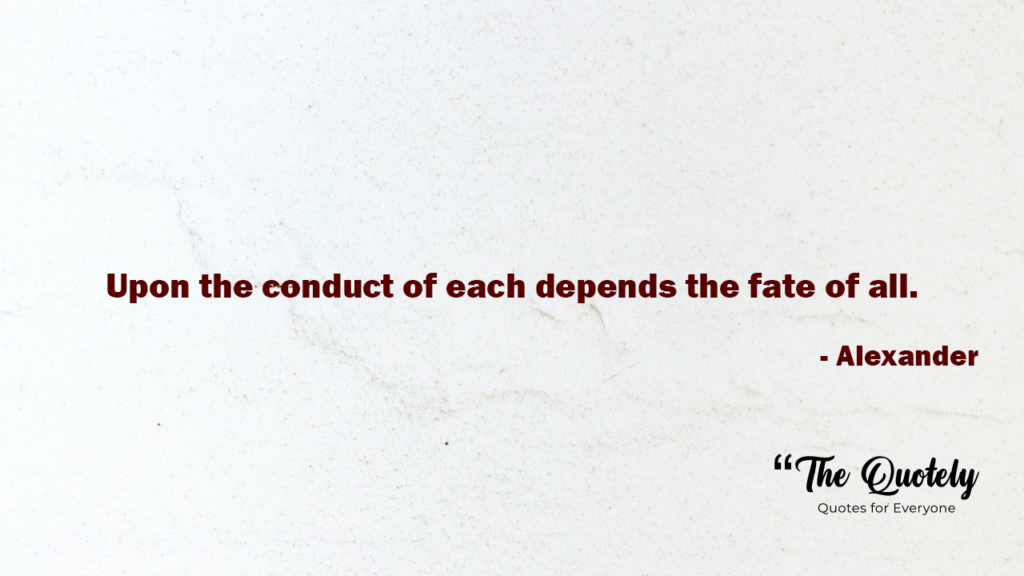
- “Upon the conduct of each depends the fate of all.”
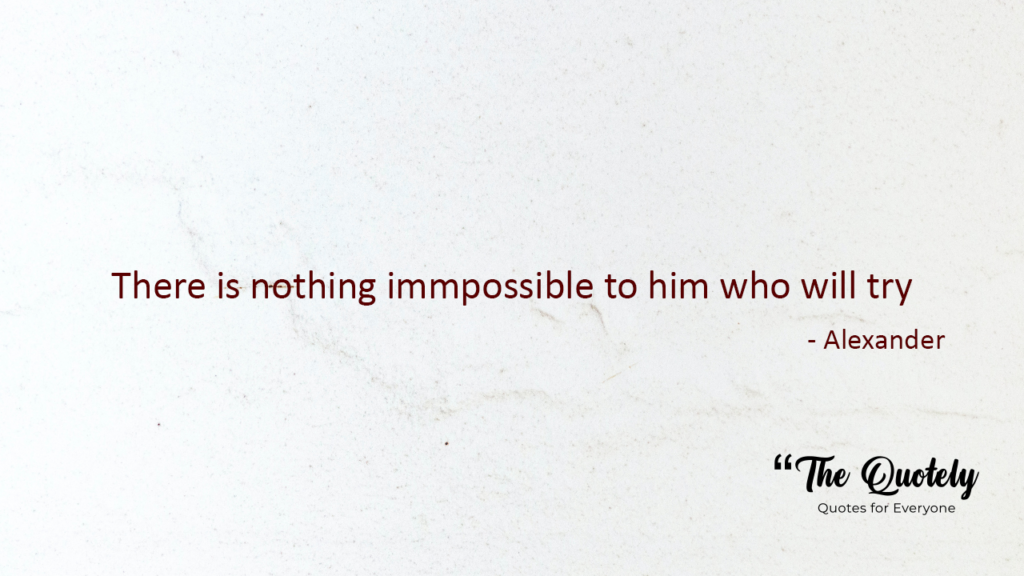
- “There is nothing immpossible to him who will try”
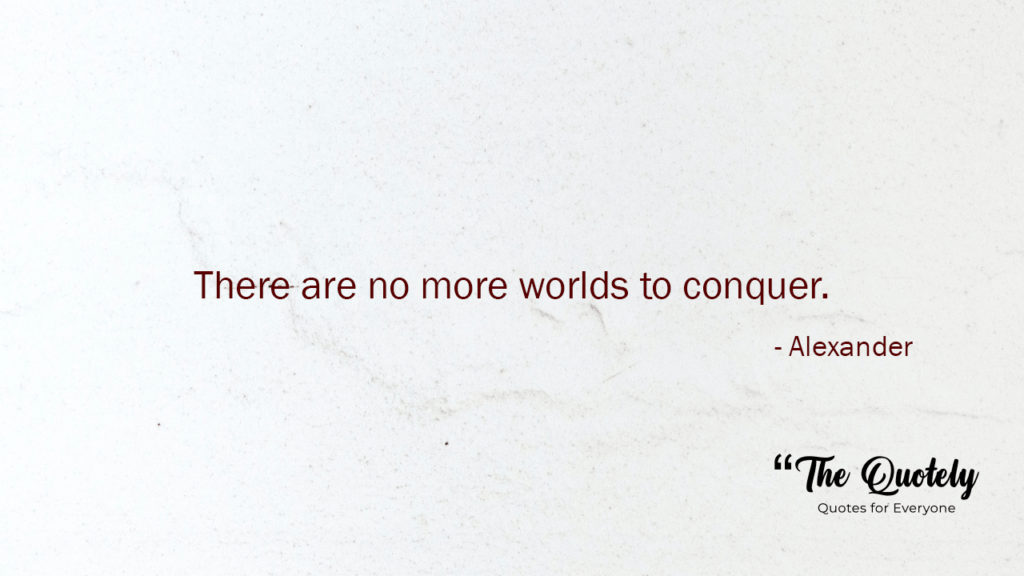
- “There are no more worlds to conquer.”
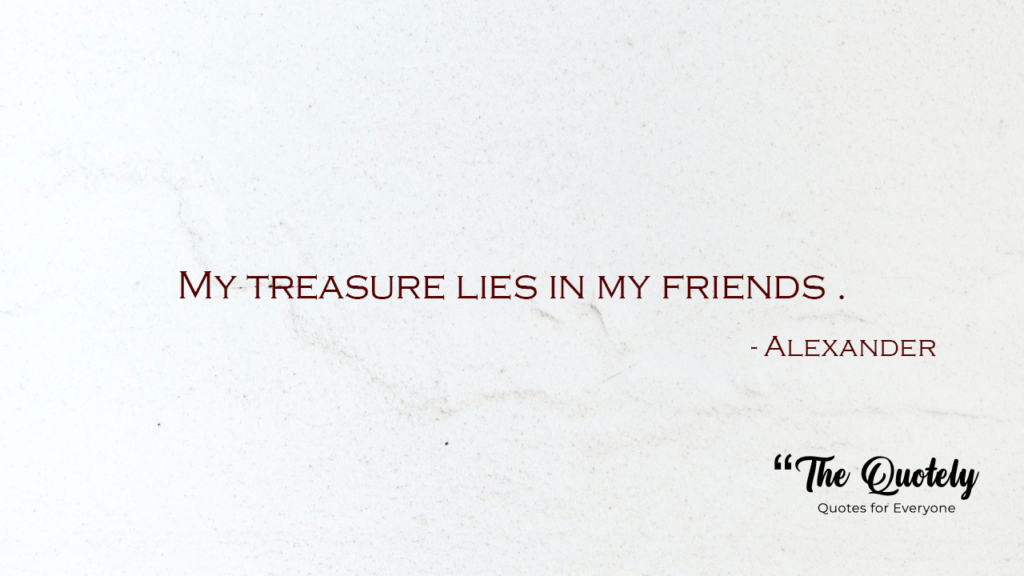
- “My treasure lies in my friends .”
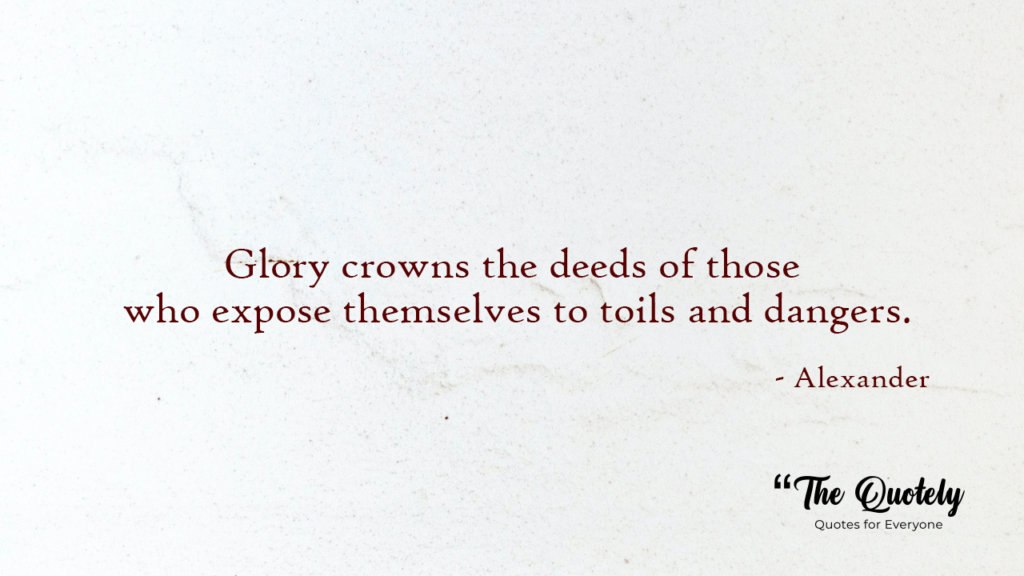
- “Glory crowns the deeds of those who expose themselves to toils and dangers.”

- “Remember, upon the conduct of each depends the fate of all.”
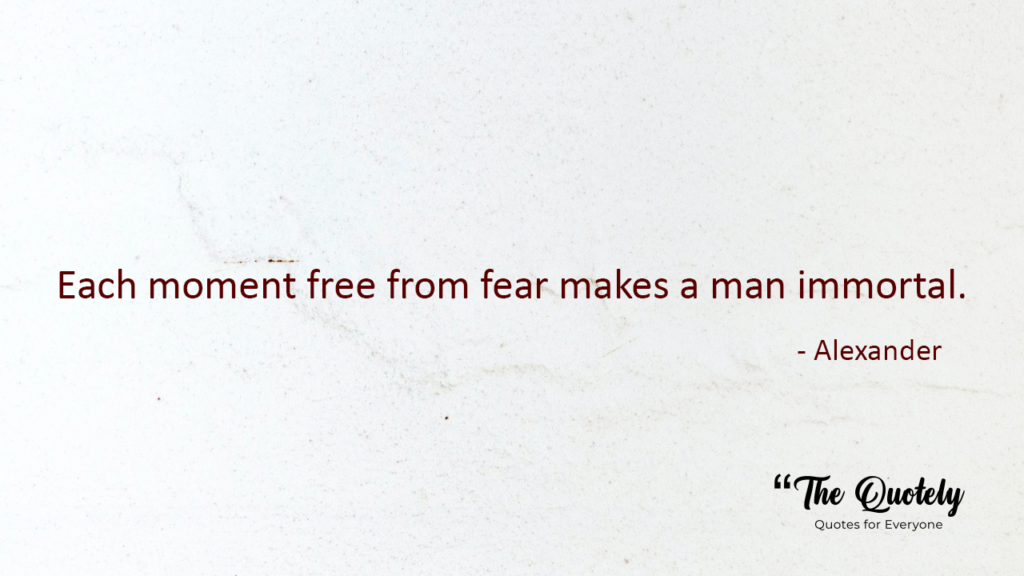
- “Each moment free from fear makes a man immortal.”
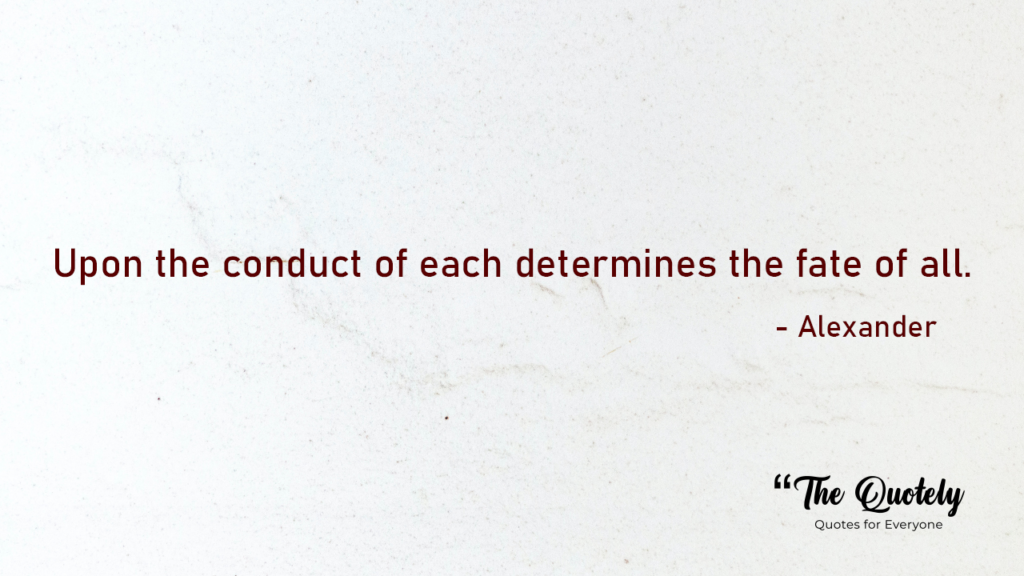
- “Upon the conduct of each determines the fate of all.”
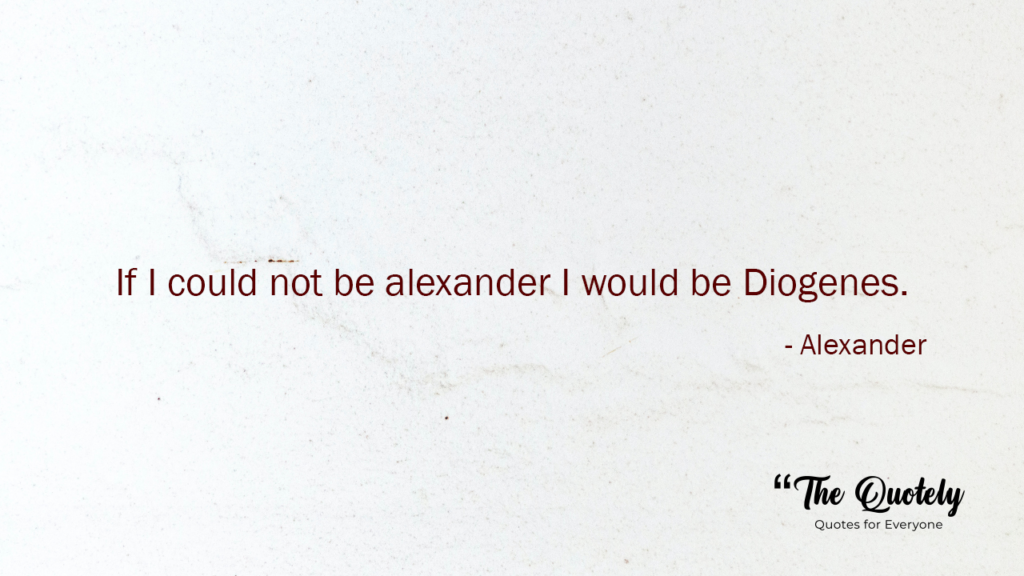
- “If I could not be alexander I would be Diogenes.”
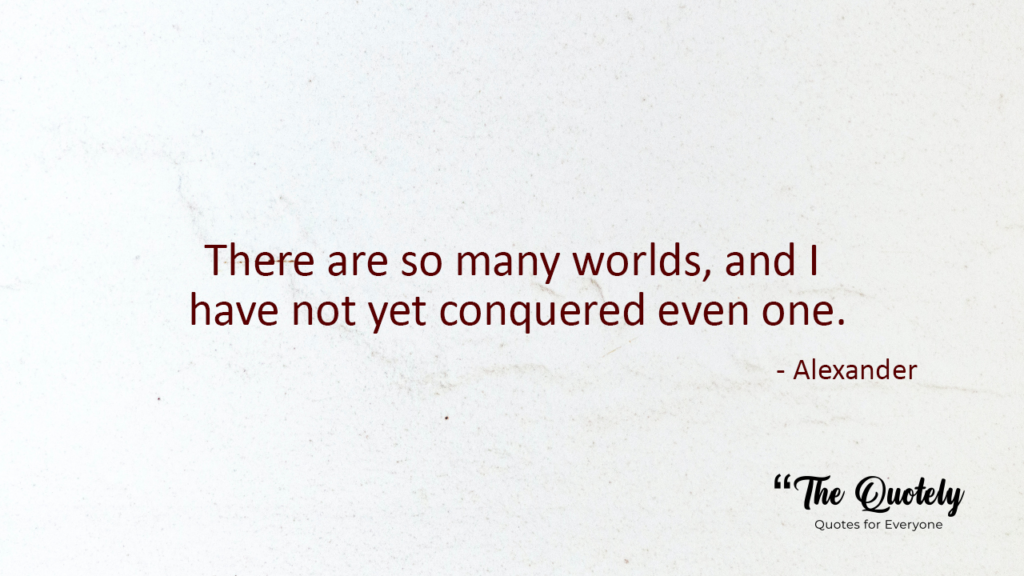
- “There are so many worlds, and I have not yet conquered even one.”
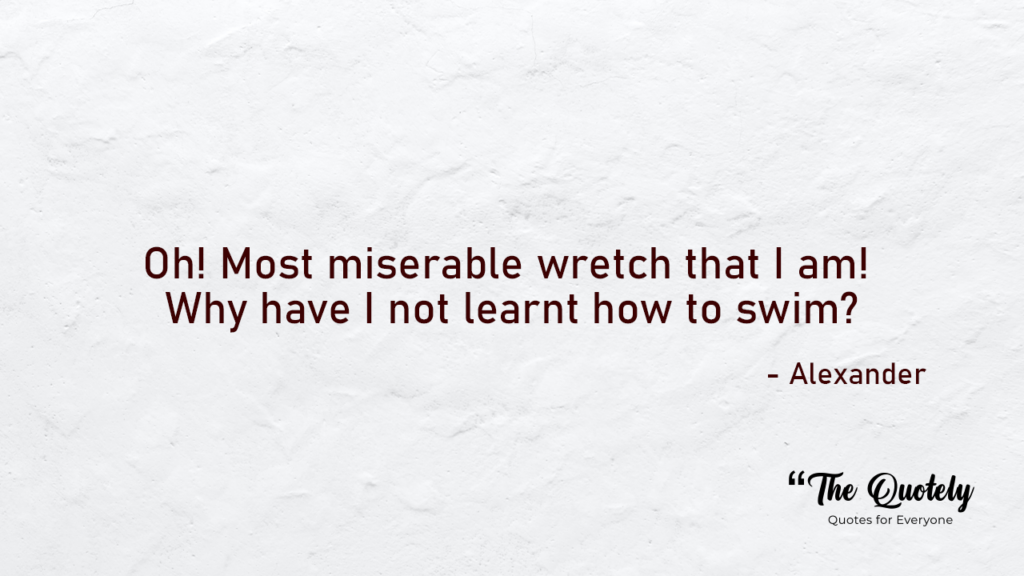
- “Oh! Most miserable wretch that I am! Why have I not learnt how to swim?”

- “Whatever possession we gain by our sword cannot be sure or lasting, but the love gained by kindness and moderation is certain and durable.”

- “How happy had it been for me had I been slain in the battle. It had been far more noble to have died the victim of the enemy than fall a sacrifice to the rage of my friends.”

- “I am dying from the treatment of too many physicians.”

- “Heaven cannot brook two suns, nor earth two masters.”
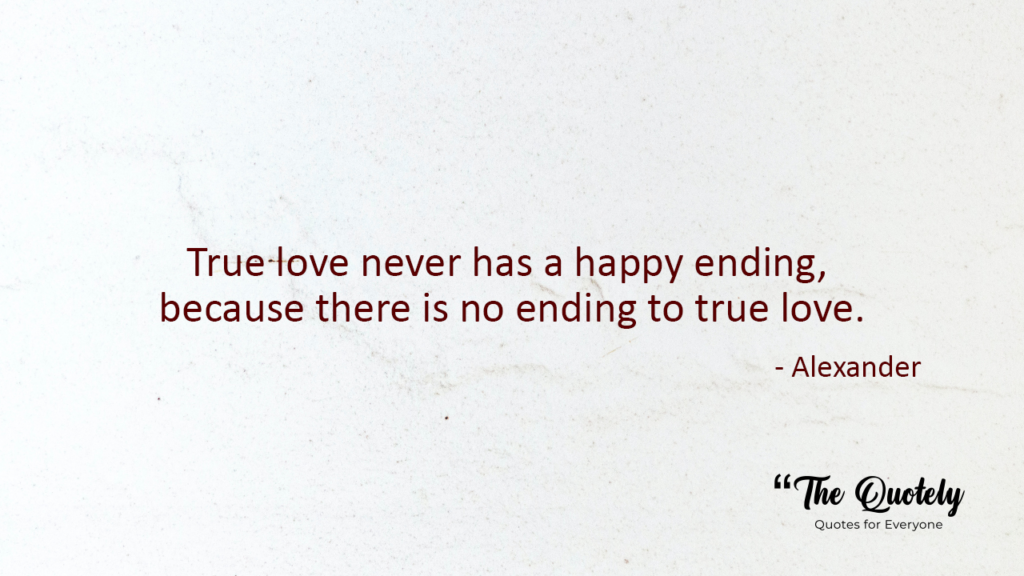
- “True love never has a happy ending, because there is no ending to true love.”
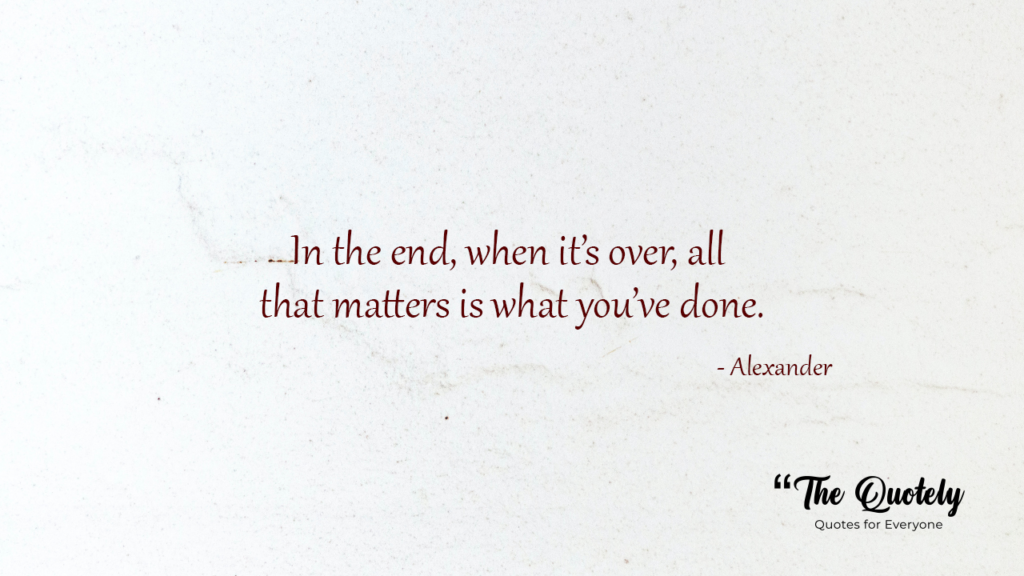
- “In the end, when it’s over, all that matters is what you’ve done.”

- “How great are the dangers I face to win a good name in Athens.”
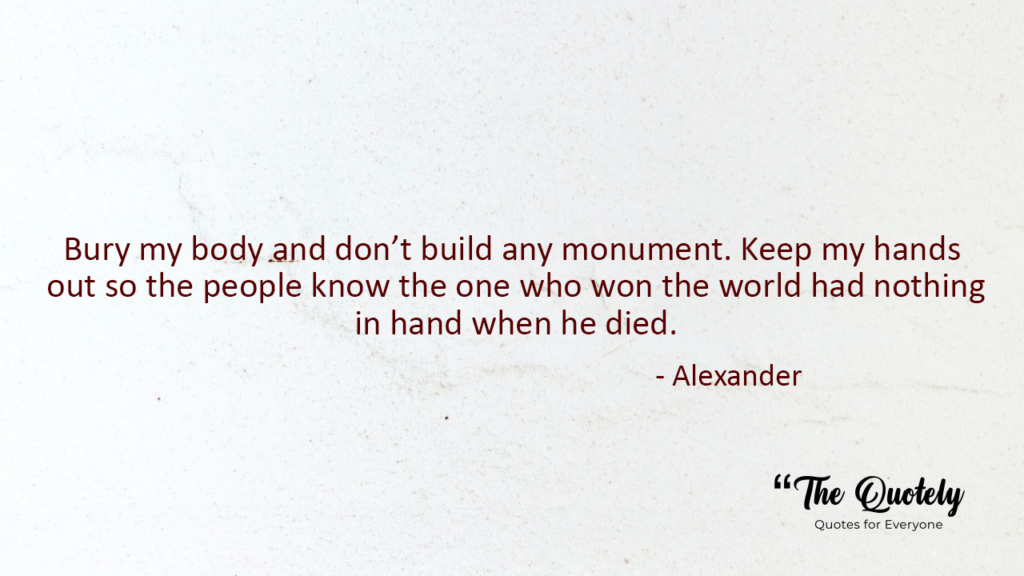
- “Bury my body and don’t build any monument. Keep my hands out so the people know the one who won the world had nothing in hand when he died.”
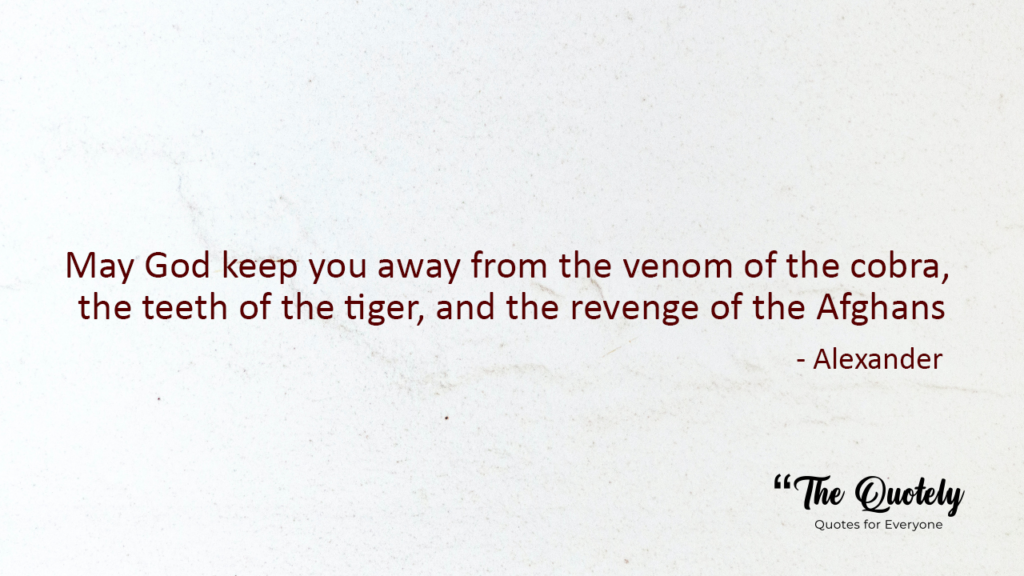
- “May God keep you away from the venom of the cobra, the teeth of the tiger, and the revenge of the Afghans.”
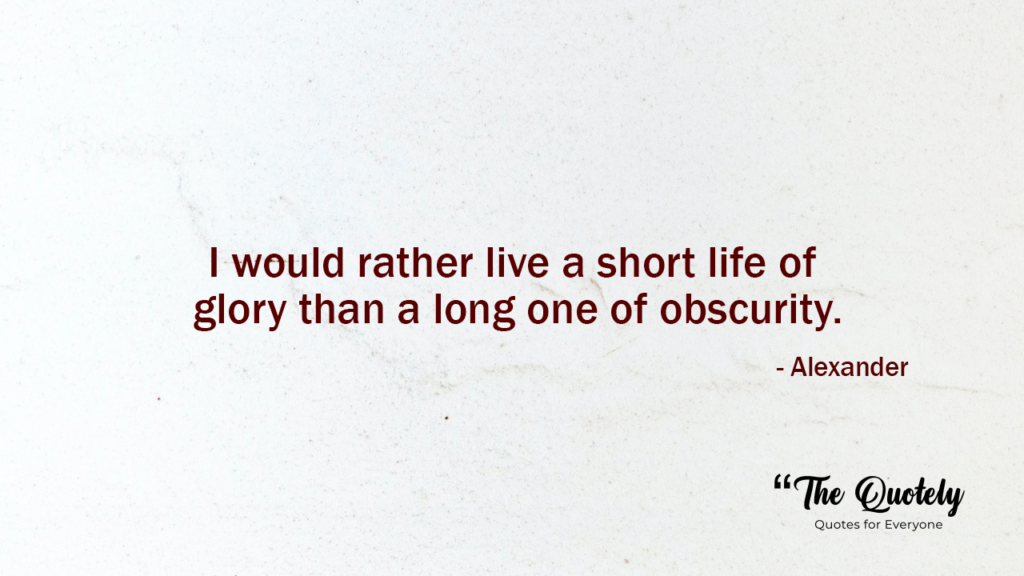
- “I would rather live a short life of glory than a long one of obscurity.”
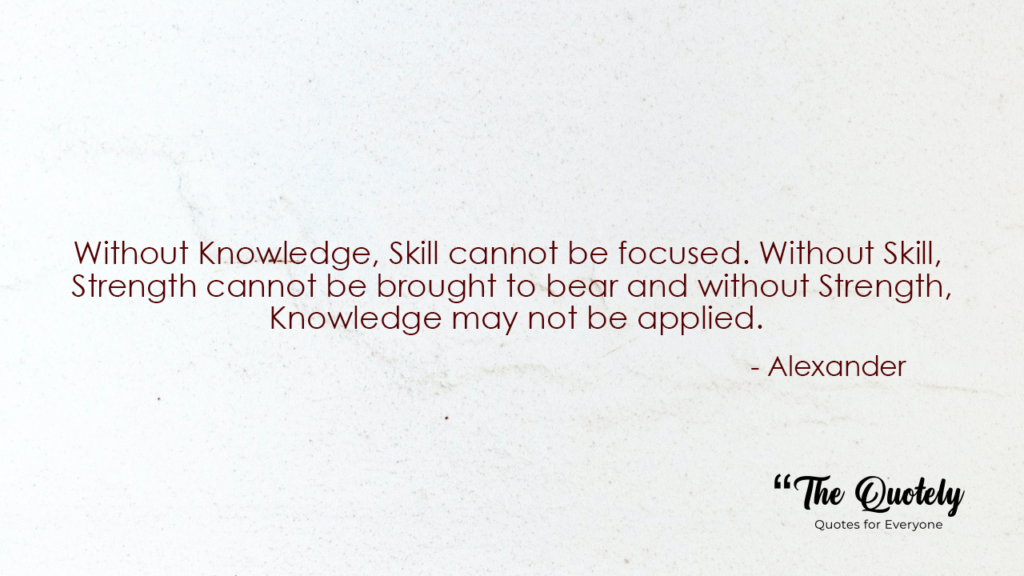
- “Without Knowledge, Skill cannot be focused. Without Skill, Strength cannot be brought to bear and without Strength, Knowledge may not be applied.”

- “Soldiers, I had lately like to have been taken from you by the attempt of a few desperate men, but by the grace and providence of the gods, I am still preserved.”
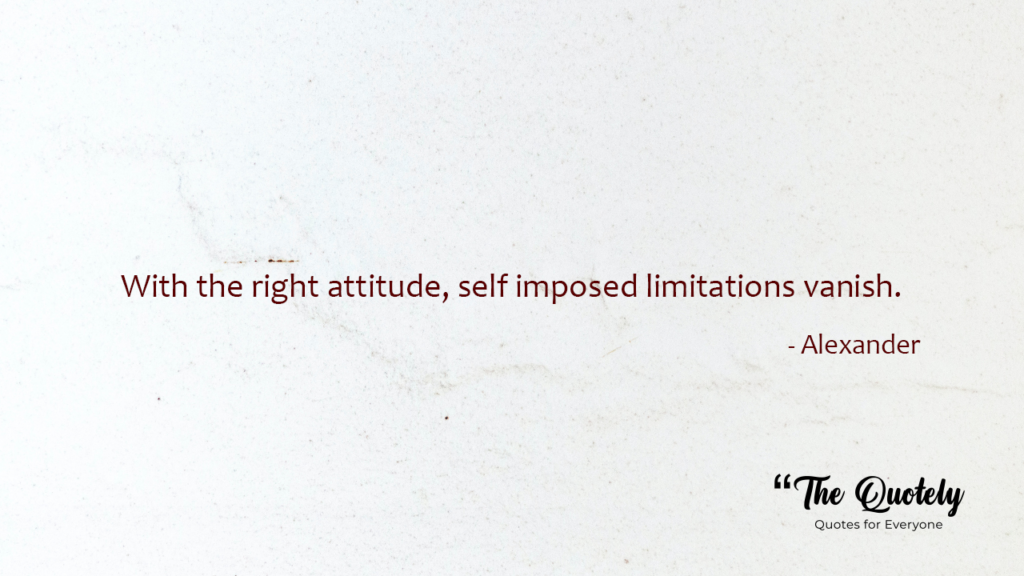
- “With the right attitude, self imposed limitations vanish.”
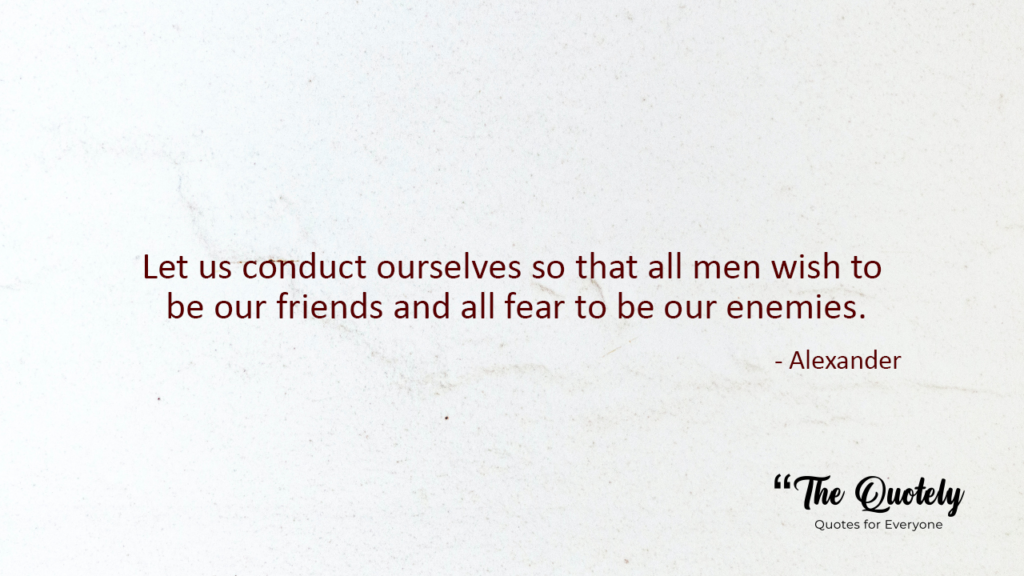
- “Let us conduct ourselves so that all men wish to be our friends and all fear to be our enemies.”
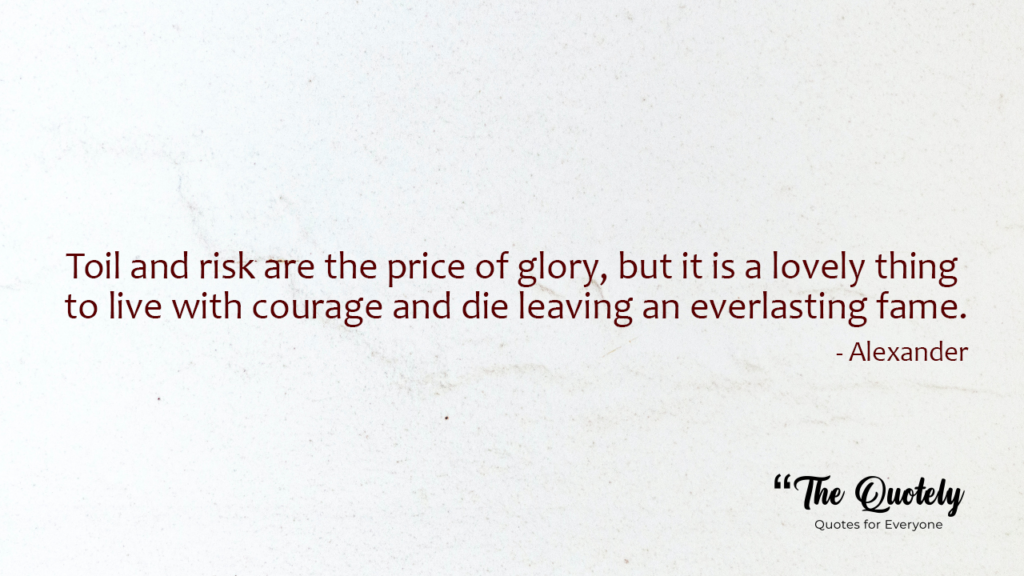
- “Toil and risk are the price of glory, but it is a lovely thing to live with courage and die leaving an everlasting fame.”
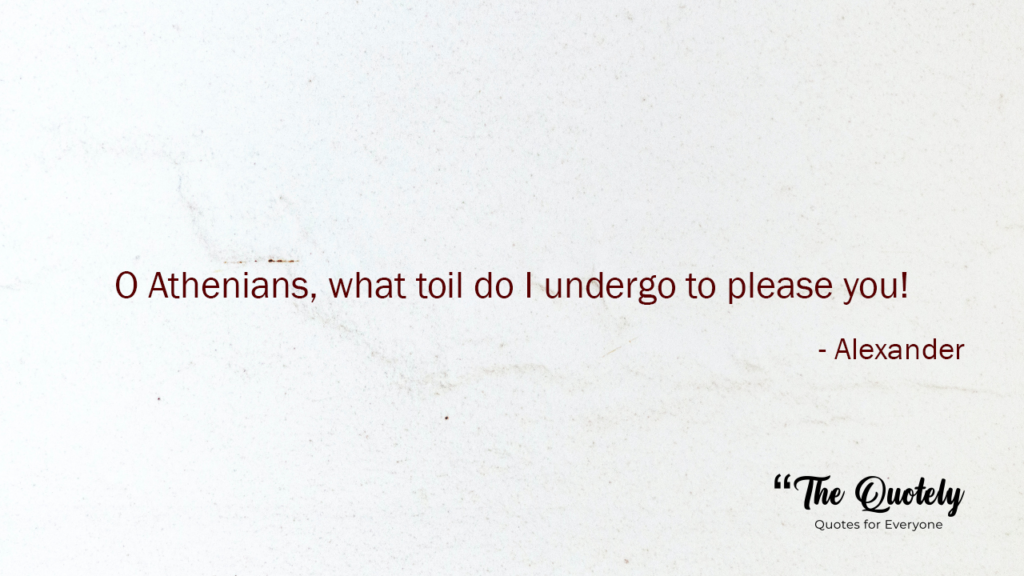
- “O Athenians, what toil do I undergo to please you!”
You May Like: Happy Birthday Cutie Pie, Happy Birthday Sissy Wishes, Bad Bitch Quotes, Hot Love Romantic Quotes, Inspirational Single Woman Quotes, Birthday Wishes for Bhabhi

- “There is nothing impossible to him who will try.”
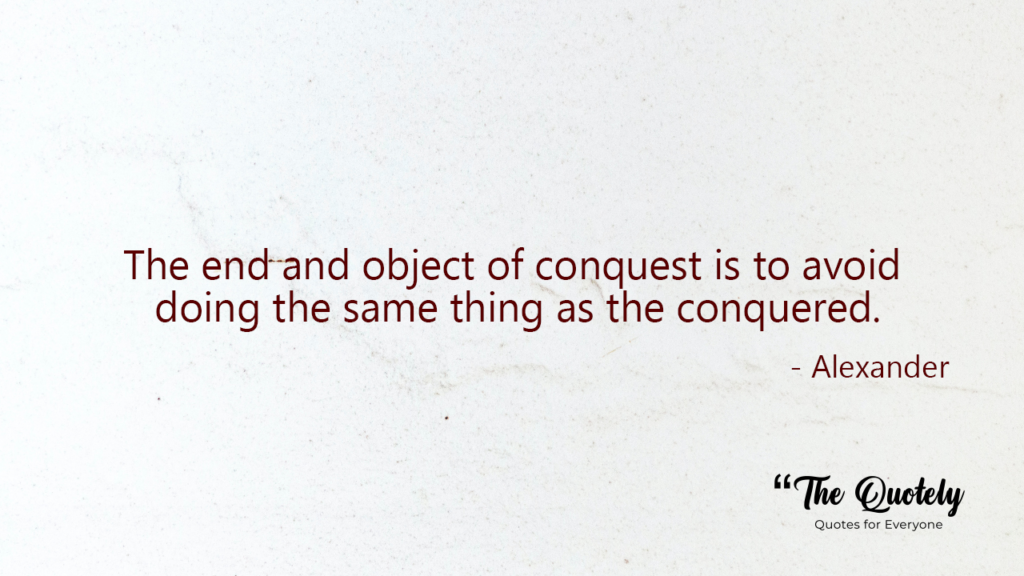
- “The end and object of conquest is to avoid doing the same thing as the conquered.”
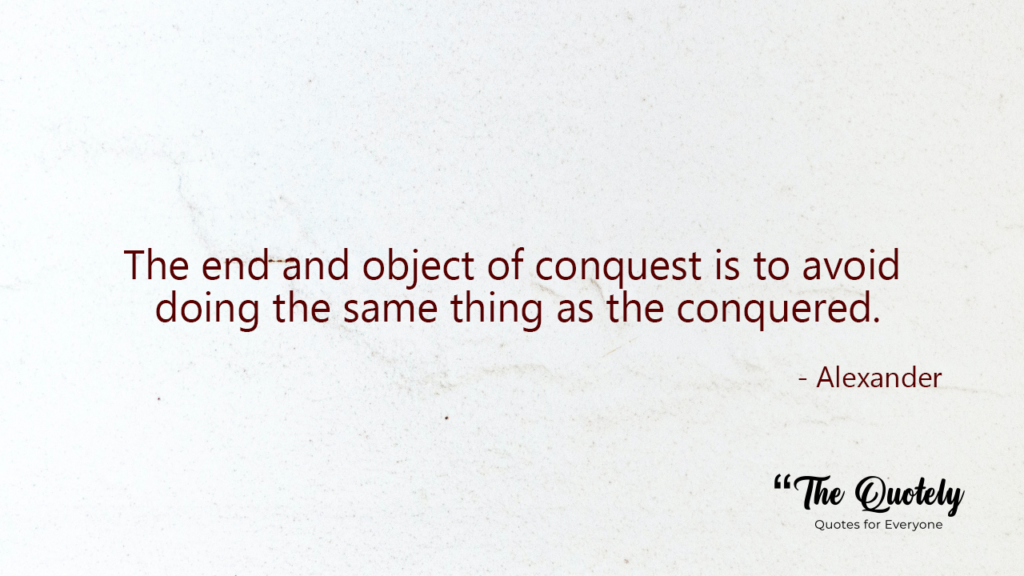
- “God must have loved Afghans because he made them so beautiful.”
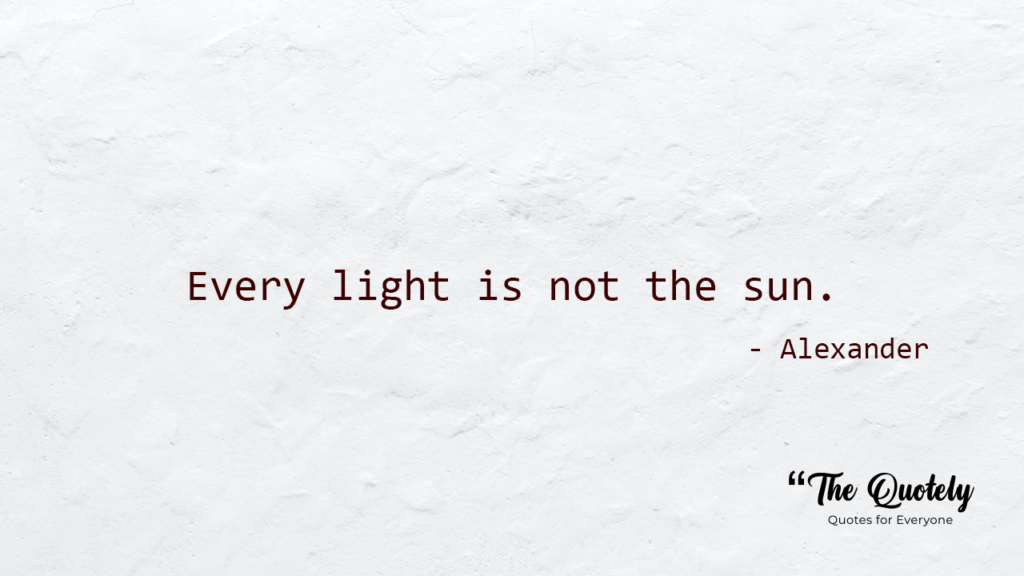
- “Every light is not the sun.”
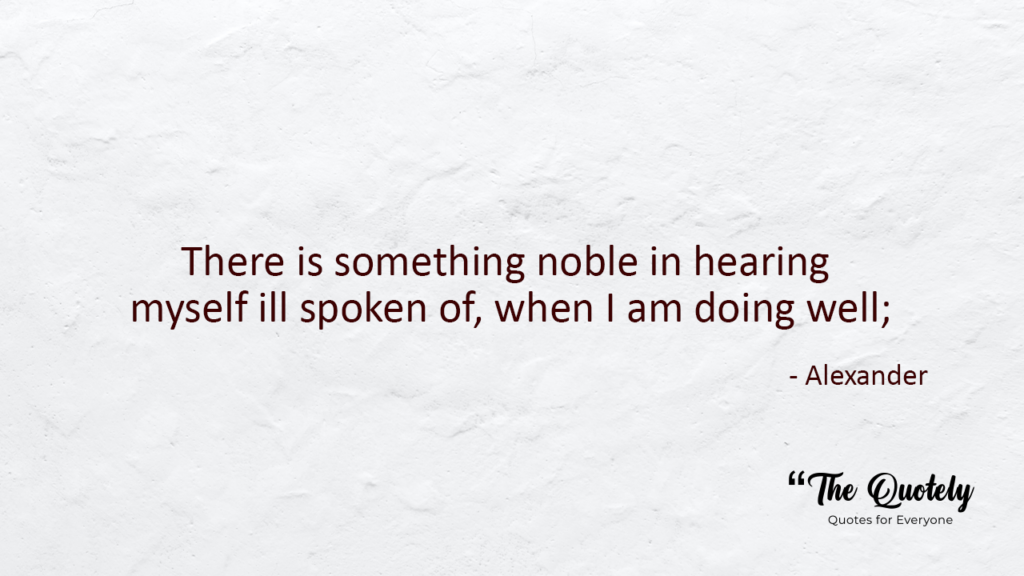
- “There is something noble in hearing myself ill spoken of when I am doing well.”

- “I am not afraid of an army of lions led by a sheep; I am afraid of an army of sheep led by a lion.”
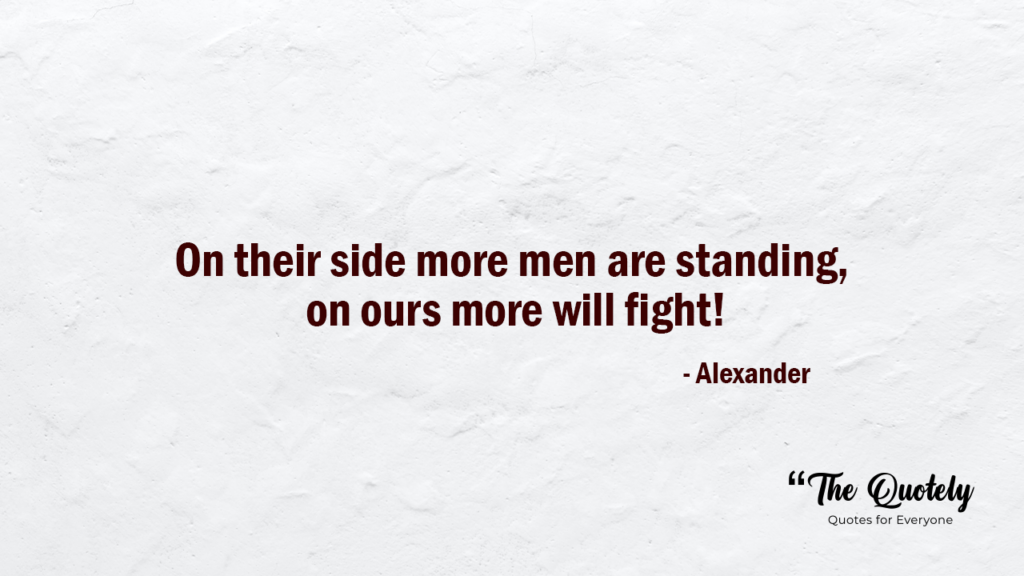
- “On their side more men are standing, on ours more will fight!”
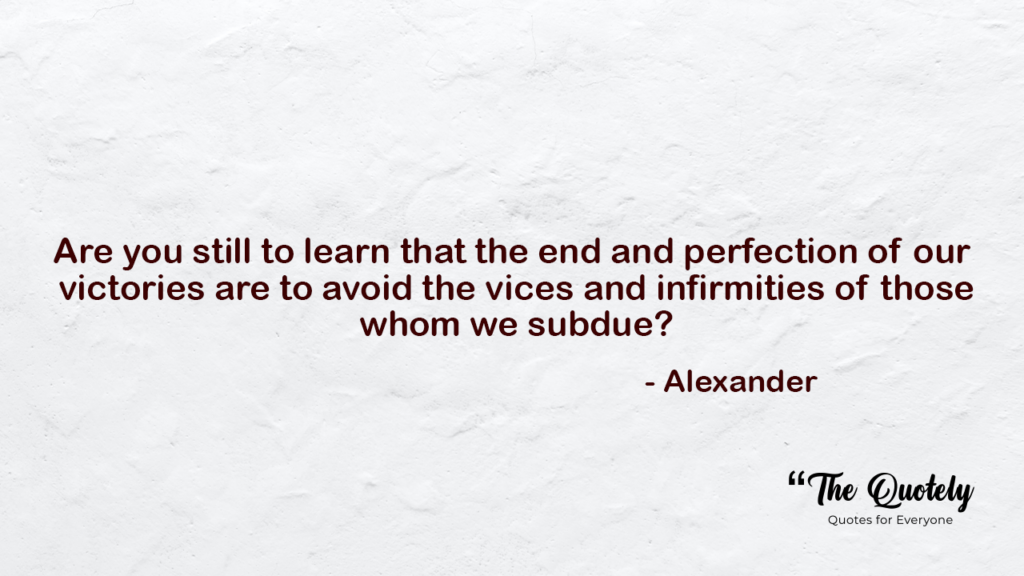
- “Are you still to learn that the end and perfection of our victories are to avoid the vices and infirmities of those whom we subdue?”
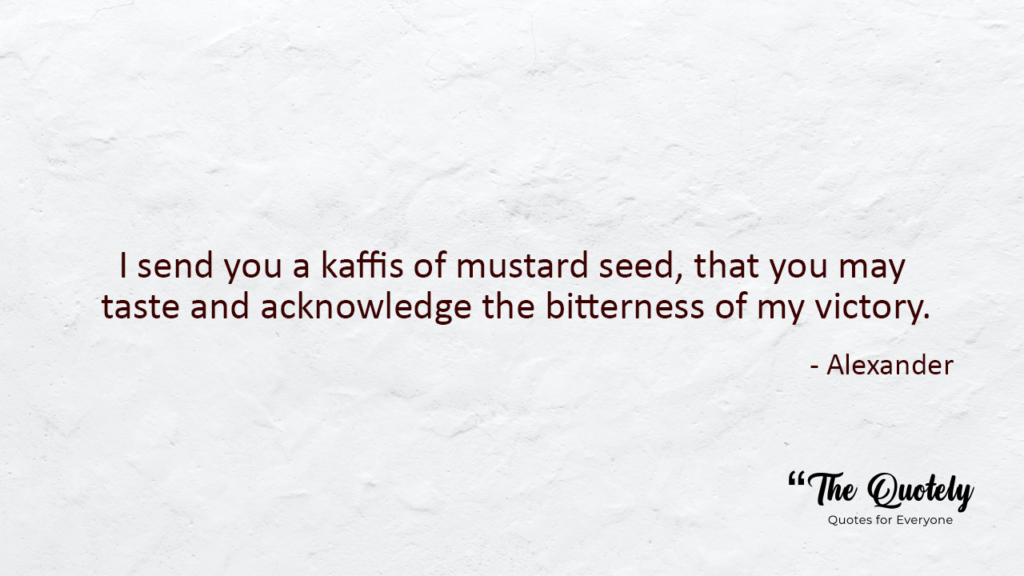
- “I send you a kaffis of mustard seed, that you may taste and acknowledge the bitterness of my victory.”
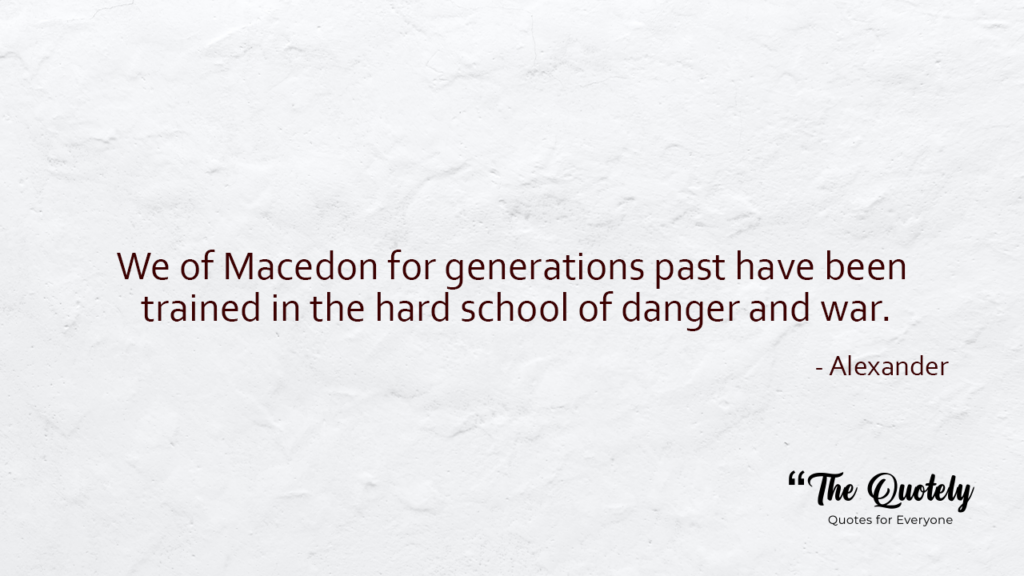
- “We of Macedon for generations past have been trained in the hard school of danger and war.”
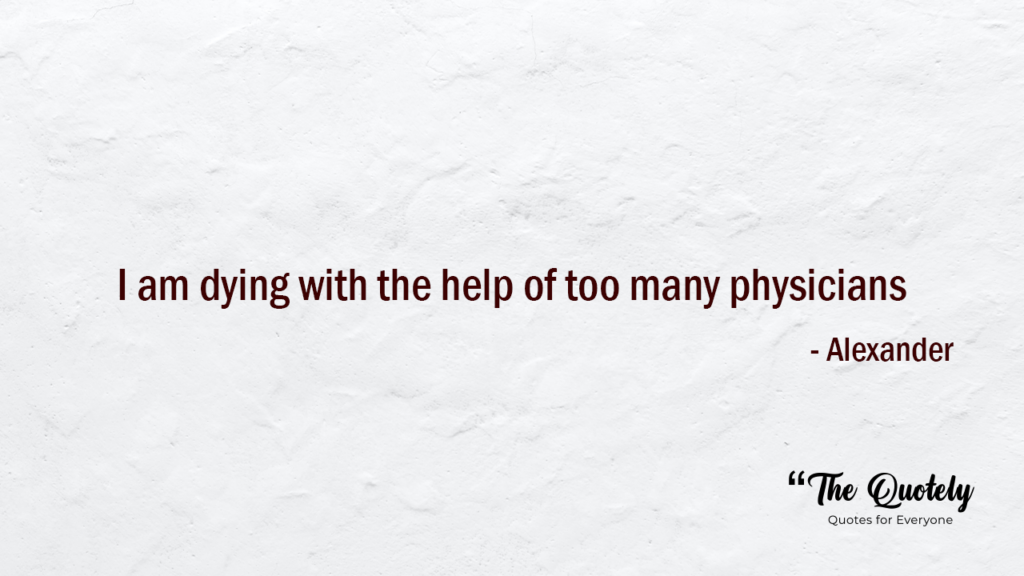
- “I am dying with the help of too many physicians.”
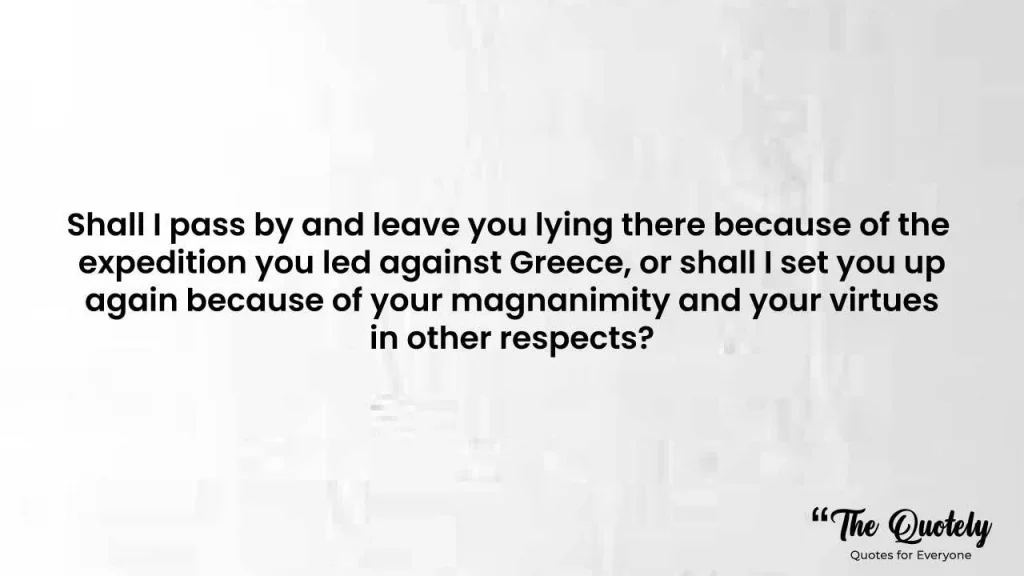
- “Shall I pass by and leave you lying there because of the expedition you led against Greece, or shall I set you up again because of your magnanimity and your virtues in other respects?”
Early life
Alexander the Great, also known as Alexander III or Alexander of Macedonia, was the king of Macedonia from 336 to 323 BCE. He overthrew the Persian empire, took Macedonian arms to India, and set the foundations for the Hellenistic world of territorial kingdoms. He was born in 356 BCE in Pella, Macedonia, and died in Babylon, Iraq, on June 13, 323 BCE. In his lifetime, he was already the subject of fantastic stories. Later, he became the hero of a full-scale legend that only vaguely resembled his real life.
Childhood and Education
Pella is the capital of the Kingdom of Macedon. Alexander was born on the sixth day of the ancient Greek month Hekatombaion, which may have been 20 July 356 BC or 20 July 356 AD. He was the son of King Philip II and his fourth wife Olympias, daughter of King Neoptolemus I, the king of Epirus. He was the son of Olympias and Philip II. Olympias was Philip’s most important wife for a while, likely because she gave birth to Alexander. Philip had seven or eight wives. At the start of his life when he was very young, Alexander was raised by a nurse named Lanike. Lanike is the sister of Alexander’s future general, Cleitus the Black. As he grew up, Alexander was taught by strict Leonidas, a relative of his mother. He also learned from Lysimachus of Acarnania.
Education
Isocrates and Speusippus were two of the people Philip looked at when he was looking for a tutor for Alexander when he was 13. Speusippus said he would resign from the Academy’s stewardship if he took the job. In the end, Philip chose Aristotle and used the Temple of the Nymphs at Mieza as a classroom for Aristotle to study in. Aristotle’s home town of Stageira, which Philip had destroyed, would be rebuilt by Philip in exchange for Alexander’s help teaching him. Philip would buy slaves and free them or pardon people who had been exiled.
When Alexander and the children of Macedonian nobles, like Ptolemy, Hephaistion, and Cassander, went to Mieza, it was like going to school. As time went on, many of these students became close friends and future generals for him. They are called the “Companions.” It was Aristotle’s job to teach Alexander and his friends everything from medicine to morals to religion to logic to art. Under the guidance of Aristotle, Alexander became a big fan of the works of Homer, especially the Iliad. Aristotle gave him an annotated copy of the book, which Alexander took with him on his campaigns. Alexander was also friends with Persian exiles who lived at the Macedonian court. Philip II helped them for a long time as they fought against Artaxerxes III.
The King of Macedon
Alexander started his reign by getting rid of people who could be a threat to the throne. He had his cousin, the former Amyntas IV, put to death. [50] As well, he killed two Macedonian princes from the region of Lyncestis. He spared Alexander Lyncestes, who was from the same region. Olympias killed Cleopatra Eurydice and her daughter, Europa, who was born to Olympias and Philip and was his wife. When Alexander found out about this, he was angry. It was also Alexander’s order to kill Attalus, who was in charge of the army’s first line of defence in Asia Minor and the uncle of Cleopatra.
The defeat of the Persian Empire
In 334 B.C., Alexander set out to conquer the Persian Empire, which had lost power but was still a huge thing. This is how it worked: Alexander had a small army of fewer than 40,000 men, mostly Macedonians who were very loyal to him. It was across the Aegean Sea in Asia Minor that Persia was. He went there (modern-day Turkey). In the end, after three years of war and three important battles, Alexander crushed the Persian armies at the Tigris River. He then conquered the mighty Persian Empire, which included the legendary city of Babylon.
Death
The death of Alexander the Great and other events that happened after have been the subject of debates. Between the evening of June 10 and the evening of June 11, 323 BC, Alexander died in the palace of Nebuchadnezzar II in Babylon. He was 32 years old. Other people think Alexander either died of malaria or was poisoned. Other retrodiagnoses include diseases that aren’t caused by bugs. It’s possible Alexander died of malaria because he caught it two weeks before his death when he went sailing in the marshes to look at flood defences, says author Andrew Chugg. One ancient account says that it took two years to plan and build a funerary cart for Alexander’s body to be taken out of Babylon. It isn’t clear how the body was kept for about two years before it was moved from Babylon. In 1889, E. A. Wallis Budge said that the body was put in a vat of honey. Plutarch said that Egyptian embalmers took care of the body.en his famous equation E=mc 2 was finally demonstrated in the most awesome and terrifying way by using the bomb to destroy Hiroshima, Japan, in 1945. For a long time he could only utter “Horrible, horrible.”


